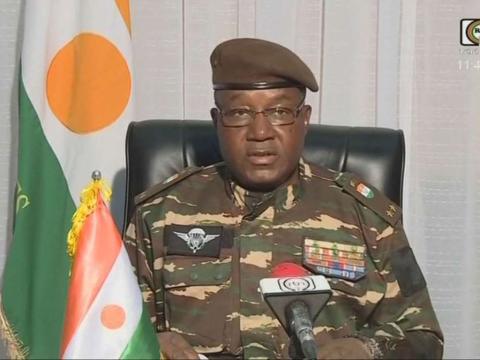By Mohamed Asmieu Bah
Some two weeks ago, in a hall jam-packed with colleague presidents and journalists drawn from all the ECOWAS member states, the newly-elected Nigerian President stated that the days for military takeover were over.
President Bola Tinubu was making his debut appearance as Nigeria's President at an ECOWAS Summit, which took place in Bissau. He arrived in the hall as the newest elected president in West Africa, representing Africa's most populous nation, and left as ECOWAS Chair, succeeding host president, Umaro Emballo. I could see the resentment in his eyes for the soldiers’ attempt to leave their barracks and occupy the presidency in their respective countries.
I was fortunate to be one of the journalists in that hall and I could see the resentment Tunubu had for the Khaki Boys' attempt to leave their barracks and try to occupy State House. The just-ousted President of Niger, Mohamed Bazoum, could not imagine he would be next to add to the list of deposed leaders in West Africa, after Burkina Faso, Mali and Guinea. On 26 July, Abdourahamane Tchiani emerged as the president of the National Council for the Safeguard of the Homeland (CNSP), which is the ruling council established by the Nigerien army after the overthrow of President Bazoum.
The reemergence of military takeovers in Burkina Faso, Mali and Guinea eroded the democratic gains that the regional body had been touting. These democratic backslides are setting a dangerous precedent for a region that is already battling with terrorism and an upsurge of Islamist attacks.
The President of the ECOWAS Commission, Dr Aliou Touray stated at the summit that terrorism continued to pose a serious threat to West Africa. Just this week, the ECOWAS diplomat was addressing the UN, where he emphatically stated that recent elections in the region showed democracy was deepening. He failed to realize that election was just part of the puzzle of play cards – it is a sum and not the whole. In less than twenty-four hours after his address he was greeted by the coup in Niger – a country that had served as a buffer for the war against Islamist terrorists in the Sahel.
The concern now for many democracy activists and the West is for other armies in the region not to borrow a leaf from their colleagues who have metamorphosed from the guardians of the state to the philosopher kings just as Plato postulated.
The militaries are almost using the same script as reason for chasing out of power duly elected leaders. How is ECOWAS going to grapple with this new threat to democracy when some of its members have attempted to change their constitutions and gone for a third term? Some have dismantled the good governance structures they inherited, denied the rule of law and paid lip service to accountability. With that permeating the body politic of West Africa, one should not be shocked if the abortion of democracy was to spread to more ECOWAS member states.
This third term wind, if not stopped, will reverse the gains made by West Africa. A region that is endowed with a youthful population who are mostly unskilled, and are a time bomb to flare up instability, should be ready to say truth to itself by urging some of its members to respect their constitutions, promote the rule of law and accountability and help nurture democracy and good governance.
If not nipped in the bud commentators believe this new threat has the proclivity to throw the whole region into crisis.
The West has pumped lots of resources to roll back the growing terrorist attacks in the region, but the military coups are reversing the gains. America and Europe are now engulfed in a serious dilemma as their key rival, Russia, is having a foothold and great influence. Mali, for instance, has taken an unprecedented move to divorce herself from her colonizer and forged a new partnership with Russia. This radical diplomatic and foreign policy shift has sent shock waves in the spine of Western powers.
This change to coups is rolling back the region to the 80s and 90s when many of the leaders at the time were either military men or civilians who had dismantled all semblance of good governance and installed the infamous one party system of governance.
The armies are using almost the same script as reason for chasing out of power duly elected leaders – they cite corruption, bad governance and failure to pursue the wars.
Just few weeks ago, Senegal one of the bastions of democracy and good governance, was engulfed in nationwide protests because of rumours that President Macky Sall was nursing the ambition to go for a third term. The demonstrations only dissipated when the President assured the nation that he was not running again after two terms.
The next few days and weeks are going to be very critical for not only Niger but the whole region, because if the coup leaders have their way, then fear has prevailed over hope, and bullet over ballot. The African Union has joined ECOWAS to condemn the coup and ordered the military to return to their barracks. Will the military heed, when Russia is fighting hard to dislodge the West and implant its grip and influence? African leaders have already started marching towards Russia to collect from the big power’s largesse. Will they forsake Russia's "gifts"? It is a mater of wait and see.
Mohamed Asmieu Bah is a Hubert H Humphrey Fellow from the Arizona State University and Acting Director of Media at the Sierra Leone Broadcasting Corporation.
Copyright © 2023 Politico








